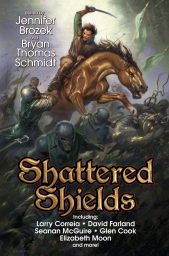 Shattered Shields is an anthology of military fantasy. In fact, it might be the first one. Baen Book published the trade paperback November 2014. The mass-market paperback came out this past February, 355 pages, and $7.99.
Shattered Shields is an anthology of military fantasy. In fact, it might be the first one. Baen Book published the trade paperback November 2014. The mass-market paperback came out this past February, 355 pages, and $7.99.
I have never heard of the editors- Jennifer Brozek and Bryan Thomas Schmidt. Brozek has edited ten small press anthologies including Jazz Age Cthulhu, had a story in one of Mercedes Lackey’s Valdemar world anthologies, and about 30+ stories in the small press.
She also co-wrote a nonfiction book Chicks Dig Gaming: A Celebration of All Things Gaming by the Women Who Love It.
Bryan Thomas Schmidt has edited six other books including the intriguingly titled Raygun Chronicles: Space Opera for a New Age. He has written three novels and three short stories.
Baen Books describes Shattered Shields as:
“Swords and Shields. Faith and Magic. Grab yours and get ready, for the enemy is on the move. High fantasy and mighty conflicts go hand-in-hand. In great wars, armies rise to fight evil hordes and heroes struggle to push beyond their imperfections and save the day. These stories include more than just epic landscapes and characters…but also epic battles.”
This is the first “military fantasy” anthology that I am aware of. Military fantasy as a distinct form branching off from sword-and-sorcery fiction was probably with Glen Cook’s 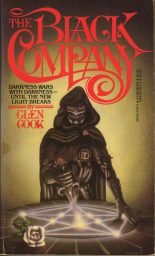 “Raker” in the August 1982 issue of The Magazine of Fantasy and Science Fiction.
“Raker” in the August 1982 issue of The Magazine of Fantasy and Science Fiction.
The contents contain a few of Baen’s stable of writers– Larry Correia, Sarah Hoyt, and Elizbeth Moon. Glen Cook is present. The rest of the contributors are often present in small press anthologies by the two editors.
“Military and Fantasy Have Gone Together From The earliest days of fantasy storytelling with tales of soldiers, armies, and battles often intertwining with those of knights, kings, and wizards. In some people’s minds, they are almost inseparable, a key element of stories from the likes of J. R. R. Tolkien, C. S. Lewis, and so on, whose tales enormous battles play key roles in the overarching stories and serve as backdrops to the main quest.”
There are 17 stories in the book. My guess is the stories run 7,000-10,000 words in length.
Dave Wolverton writing as writing as “David Farland” starts things out with “Ashes and Starlight.” It is in his “Runelords” world but set hundreds of years before the books (which I have not read). This is an efficient monster story. Not spectacular but competently executed. Not a bad start for the book.
“The Fixed Stars” by Seanan McGuire is tied in with her “October Daye” series. I have not read anything by McGuire before but some checking at her website gives the impression she writes what can be described as “urban fantasy.” This story is set in 572 in Albion with siege of Castle Broceliande. If this is truly set in our world, Albion is Britain and there were no castles, only Saxon halls and some Celtic brochs and raths. The tone struck me as anachronistic. There is nothing really here to distinguish the story as “military.” It is fantasy with a siege taking place but the story struck me as being out of place.

I have not read much Larry Correia but have liked what I have. This is a prequel to his Son of the Black Sword (which I have not read yet). A butcher leads a rebellion against an oppressive caste system. The paperback for Son of the Black Sword is out in September. It looks to be one of those in-between mass market and trade paperback sizes. “The Keeper of Names” whets my appetite to read the succeeding novel.
John Helfers’ “The Smaller We Are” has a genocidal war between humans and non-humans such as goblins, elves, gnomes, pixies etc. It is a grim story told in first person with a grim ending.
I had already forgot Annie Bellet’s “Invictus,” a sailing ship tale. There is cat and mouse with a ship carrying a diplomatic mission from a hostile ship. The ending was a bit of a let down after the build up through the story.
I hated Sarah Hoyt’s “Rising Above.” It is a semi-humorous story about using intelligent dragons in warfare. Way too close to L. Sprague de Camp for my taste. One of these days, I am going to write a piece on fatal siren call of Unknown/Unknown Worlds magazine.
Joe Zieja’s “A Cup of Wisdom” is meant to be a cautionary tale to a young heir to view war with revulsion. There are some good battles scenes. The idea of the story flies in the face of some of what Martin van Creveld has written. He has studied warfare and post traumatic stress disorder did not exist before the American Civil War. Generations before did not view war with revulsion and had no regrets. An example of the problem with military fantasy writers projecting modern views backwards.
I did not like Wendy Wagner’s “Words of Power” with the use of golem’s in warfare. It appears to be an alternate time line with women soldiers and nonsensical entities such as the Amero-Hungarians and Chino-French.
“Lightweaver in Shadow” by Gray Rhinehart is very military oriented with a confused battle in the fog. This story encapsulates what this anthology should be about.
“Hoofsore and Weary” by Cat Rambo is another story I really disliked. Centaurs using terms like “sarge.” More backwards projecting. Sergeant in medieval times meant someone who serves. King Philip Augustus II of France had a bodyguard in the Third Crusade called the Sergeant at Arms as protection from the Assassins.
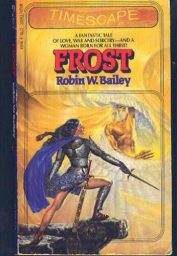 Robin Wayne Bailey had a novel for Timescape called Frost in 1982 and this story is tied to that book. Bailey had appearances in some Marion Zimmer Bradley edited anthologies in the 1980s. Samidar, a warrior woman sorceress is on the trail of the witch Persea who murdered her twin sister Jannica. Samidar had a relationship with Jannica:
Robin Wayne Bailey had a novel for Timescape called Frost in 1982 and this story is tied to that book. Bailey had appearances in some Marion Zimmer Bradley edited anthologies in the 1980s. Samidar, a warrior woman sorceress is on the trail of the witch Persea who murdered her twin sister Jannica. Samidar had a relationship with Jannica:
“Jannica loved you with all her heart. Although you only spent day together, she knew you every night. You were fated to love her.”
The femizon tropes are all here with riding a stallion, a magic sword and bow. Samidar takes on a patrol of Persea’s henchmen and wipes them out. I will say the level of competence of writing here prevents the story from devolving into a Xena, Warrior Princess episode.
I liked Nancy Fulda’s “Deadfall.” It could have been longer. A sorcerer uses possessed savages to assault the city with floating rafts.
I generally like John R. Fulzt’s short fiction and this is no exception with “Yael of the Strings.” He did flunk Evolutionary Biology 101 with his evil albino inhabitants of the jungle continent in his Books of the Shaper series. He does write some of the best Clark Ashton Smith inspired short fiction out there today. A court minstrel is sent to sing to the troops the night before a battle to encourage them. He ends up being impressed into the fighting.
Dave Gross “The Gleaners” was a pleasant surprise. The aftermath of a battle with the “gleaners” who strips the dead for valuables. There is a nice touch of horror to the story, 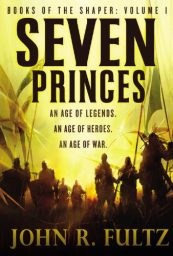 an element generally missing in this anthology.
an element generally missing in this anthology.
James L. Sutter’s “Bonded Men” has an elite unit of 100 pairs of male lovers. The idea is they don’t fight for wives and children back home but for each other at that moment. The fight scenes involve more of gladiatorial moves of individual combats. I kept thinking a cohort of Roman legionaries would make short work of that. The enemy captures some members of the Bonded Legion and offers a deal. If they desert and go over to him, he will spare his captives. The Bonded Legion turns the tables.
“They kissed, beard meeting smooth-shaved chin. Around them, horns blew, and the Bonded Legion began to march.”
I liked the evil Lord Eron character.
I am going to come out of the closet as a heretic. I do not like The Black Company and generally don’t like Glen Cook’s fiction. I read “Raker” in The Magazine of Fantasy and Science Fiction back in the day. I thought it was an interesting experiment but a literary dead end. The Black Company novels are too dialogue driven with a near absence of description for my taste. I don’t like the world building. The idea of this elite mercenary company given all the dirty jobs does not ring true to history. There have been elite units as the Varangian Guard, Swiss Guard in France, and the Swiss Guard of the Papal States. More often mercenaries conformed to Machiavelli’s description:
“Mercenaries and auxiliaries are useless and dangerous; and if one holds his state based on these arms, he will stand neither firm nor safe; for they are disunited, ambitious and without discipline, unfaithful, valiant before friends, cowardly before enemies; they have neither the fear of God nor fidelity to men, and destruction is deferred only so long as the attack is; for in peace one is robbed by them, and in war by the enemy. The fact is, they have no other attraction or reason for keeping the field than a trifle of stipend, which is not sufficient to make them willing to die for you. They are ready enough to be your soldiers whilst you do not make war, but if war comes they take themselves off or run from the foe.”
“Bone Candy” has the Black Company in winter quarters with the threat of sorcerous infiltration. I lost interest part way through the story.
Elizabeth Moon’s “First Blood” is the first thing I have read by her. She managed to write the most military oriented story in the book. Characterization was good, pacing, and story all competent or better. I will be reading more by her.
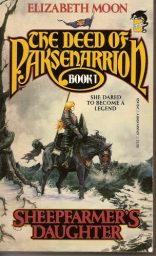
So there you have it. I give it a three harmonic chromosomes out of five rating. Some stories I disliked, some were meh, a few I liked.
Using the term “military fantasy,” I thought I would be getting tales of shield walls, cohorts, and phalanxes; spathas, saxes, and sarissas; housecarles, kerns, and galloglachs; clibanarii, cataphracts, and sipahis. You get the idea. Outside of Elizabeth Moon, this element was notably absent.
I have had doubts that military fantasy can become a freestanding sub-genre. I see too much backward projection and not enough research in ancient, classical, and medieval warfare. It is a sub-genre with potential but writers are going to have to do better. It is like writing historical fiction, you better have more than vaguely superficial knowledge.
At the end of the day, Shattered Shields was just a fantasy anthology that was rather light on the military component.
Baen has another anthology of military fantasy, Operation Arcana edited by John Joseph Adams. The mass-market paperback is out in October. I am not hopeful looking at the list of authors present. I will take the bullet reading it so you don’t have to.
Excellent review. I can avoid this one now with a clear conscience. There are simply too many good books that demand reading for me to waste time on mediocre ones.
Curious that Paul Kearney wasn’t asked to contribute – surely the foremost exponent of military fantasy working today.
But then if his latest book is any indication then he appears to have abandoned such now to follow the Philip Pullman route instead. A crying shame in both senses.
Sounds terrible, and I’m very glad you took the bullet for the rest of us. The lack of historical and military knowledge encountered in so much contemporary fantasy is stunning.
I will write in defense of the Black Company, pace Machiavelli. They are not a typical condottiero company, instead, as the book slowly reveals, the descendants of an apocalyptic cult who’ve managed to keep the traditions and cohesion, if not the beliefs. They also sell themselves to employers as a sort of special ops. unit.